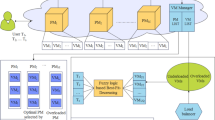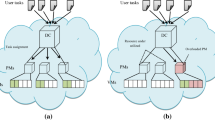Abstract
With the enhancing demand of the cloud computing products, task scheduling issue has become the hot study topic in this area. The task scheduling issue of the cloud computing method is more difficult than the conventional distributed system. The majority of the previous scheduling schemes use virtual machine (VM) instances, which takes enormous start up time and requires the full resources to perform the tasks. The proposed approach utilizes an Adaptive Neuro-Fuzzy Inference System (ANFIS)-Black Widow Optimization (BWO) (ANFIS-BWO) method for establishing the proper VM for every task with less delay. Resource scheduling is another important objective for optimal usage of resources (servers) in the cloud environment. The BWO algorithm is used to obtain the best solution in the ANFIS scheme. The proposed approach can employ the VMs on the best server by the optimal scheduling scheme. The main aim of the proposed approach is to minimize the computational time, computational cost, and energy consumptions of the tasks with useful resource utilization. We describe that the proposed approach performs better than the existing approach concerning performance metrics such as computational time, makespan, energy consumption, computational cost, and resource utilization.








Similar content being viewed by others
References
Stergiou, C., Psannis, K. E., Kim, B. G., & Gupta, B. (2018). Secure integration of IoT and cloud computing. Future Generation Computer Systems., 1(78), 964–975.
Buyya, R., Vecchiola, C., & Selvi, S. T. (2013). Mastering cloud computing: Foundations and applications programming. Newnes.
Noor, S., Koehler, B., Steenson, A., Caballero, J., Ellenberger, D., & Heilman, L. (2019). IoTDoc: A docker-container based architecture of IoT-enabled cloud system. In 3rd IEEE/ACIS international conference on big data, cloud computing, and data science engineering 2019 May 29 (pp. 51–68). Springer.
Kim, N. Y., Ryu, J. H., Kwon, B. W., Pan, Y., & Park, J. H. (2018). CF-CloudOrch: Container fog node-based cloud orchestration for IoT networks. The Journal of Supercomputing., 74(12), 7024–7045.
Luo, J., Yin, L., Hu, J., Wang, C., Liu, X., Fan, X., & Luo, H. (2019). Container-based fog computing architecture and energy-balancing scheduling algorithm for energy IoT. Future Generation Computer Systems, 1(97), 50–60.
Pandi, V., Perumal, P., Balusamy, B., & Karuppiah, M. (2019). A novel performance enhancing task scheduling algorithm for cloud-based E-health environment. International Journal of E-Health and Medical Communications (IJEHMC)., 10(2), 102–117.
Tang, Z., Qi, L., Cheng, Z., Li, K., Khan, S. U., & Li, K. (2016). An energy-efficient task scheduling algorithm in DVFS-enabled cloud environment. Journal of Grid Computing, 14(1), 55–74.
Choi, S., Myung, R., Choi, H., Chung, K., Gil, J., &Yu, H. (2016). December. Gpsf: general-purpose scheduling framework for container based on cloud environment. In 2016 IEEE international conference on internet of things (iThings) and IEEE green computing and communications (GreenCom) and IEEE cyber, physical and social computing (CPSCom) and IEEE smart data (SmartData) (pp. 769–772). IEEE.
Patra. M. K., Patel, D., Sahoo, B., & Turuk, A. K. (2020). Game theoretic task allocation to reduce energy consumption in containerized cloud. In 2020 10th international conference on cloud computing, data science and engineering (confluence) (pp. 427–432). IEEE.
Wu, S., Niu, C., Rao, J., Jin, H., & Dai, X. (2017). Container-based cloud platform for mobile computation offloading. In 2017 IEEE international parallel and distributed processing symposium (IPDPS) (pp. 123–132). IEEE.
Canosa, R., Tchernykh, A., Cortes-Mendoza, J. M., Rivera-Rodriguez, R., Rizk, J. L. Avetisyan, A., & Concepcion Morales, E. R. (2018). Energy consumption and quality of service optimization in containerized cloud computing. In 2018 IvannikovIspras open conference (ISPRAS). https://doi.org/10.1109/ispras.2018.00014.
Liu, L., Fan, Q., & Buyya, R. (2018). A deadline-constrained multi-objective task scheduling algorithm in mobile cloud environments. IEEE Access, 18(6), 52982–52996.
Hu, H., He, J., He, X., Yang, W., Nie, J., & Ran, B. (2019). Emergency material scheduling optimization model and algorithms: a review. Journal of Traffic and Transportation Engineering (English edition), 6, 441–454.
Kaur, M., & Kadam, S. (2018). A novel multi-objective bacteria foraging optimization algorithm (MOBFOA) for multi-objective scheduling. Applied Soft Computing, 1(66), 183–195.
Madni, S. H., Latiff, M. S., & Ali, J. (2019). Multi-objective-oriented cuckoo search optimization-based resource scheduling algorithm for clouds. Arabian Journal for Science and Engineering, 44(4), 3585–3602.
Reddy, G. N., Kumar, S. P. (2017). Multi objective task scheduling algorithm for cloud computing using whale optimization technique. In International conference on next generation computing technologies (pp. 286–297). Springer.
Abualigah, L., & Diabat, A. (2020). A novel hybrid antlion optimization algorithm for multi-objective task scheduling problems in cloud computing environments. Cluster Computing, 24, 1–19.
Zhang, M., & Li, G. (2018). Multi-objective optimization algorithm based on improved particle swarm in cloud computing environment. Discrete and Continuous Dynamical Systems-S, 12(4 & 5), 1413.
Srichandan, S., Kumar, T. A., & Bibhudatta, S. (2018). Task scheduling for cloud computing using multi-objective hybrid bacteria foraging algorithm. Future Computing and Informatics Journal, 3(2), 210–230.
Alkayal, E. S., Jennings, N. R., & Abulkhair, M. F. (2016). Efficient task scheduling multi-objective particle swarm optimization in cloud computing. In 2016 IEEE 41st conference on local computer networks workshops (LCN workshops) (pp. 17–24). IEEE.
Li, K., & Wang, J. (2017). Multi-objective optimization for cloud task scheduling based on the ANP model. Chinese Journal of Electronics, 26(5), 889–898.
Liu, Bo., Li, P., Lin, W., Shu, Na., Li, Y., & Chang, V. (2018). A new container scheduling algorithm based on multi-objective optimization. Soft Computing, 22(23), 7741–7752.
Hassan, B. A. (2021). CSCF: A chaotic sine cosine firefly algorithm for practical application problems. Neural Computing and Applications, 33(12), 7011–7030. https://doi.org/10.1007/s00521-020-05474-6.
Sundararaj, V. (2016). An efficient threshold prediction scheme for wavelet based ECG signal noise reduction using variable step size firefly algorithm. International Journal of Intelligent Engineering and Systems, 9(3), 117–126.
Sundararaj, V., & Selvi, M. (2021). Opposition grasshopper optimizer based multimedia data distribution using user evaluation strategy. Multimedia Tools and Applications. https://doi.org/10.1007/s11042-021-11123-4.
Alam, M.G., & Baulkani, S. (2019). Local and global characteristics-based kernel hybridization to increase optimal support vector machine performance for stock market prediction. Knowledge and Information Systems, 60(2), 971–1000.
Nirmal Kumar, S. J., Ravimaran, S., & Alam, M. M. (2020). An effective non-commutative encryption approach with optimized genetic algorithm for ensuring data protection in cloud computing. Computer Modeling in Engineering & Sciences, 125(2), 671–697.
Jose, J., Gautam, N., Tiwari, M., Tiwari, T., Suresh, A., Sundararaj, V., & Rejeesh, M. R. (2021). An image quality enhancement scheme employing adolescent identity search algorithm in the NSST domain for multimodal medical image fusion. Biomedical Signal Processing and Control, 66, 102480.
Nisha, S., & Madheswari, A. N. (2016). Secured authentication for internet voting in corporate companies to prevent phishing attacks. International Journal of Emerging Technology in Computer Science & Electronics (IJETCSE), 22(1), 45–49.
Albert, P., & Nanjappan, M. (2020). An efficient kernel FCM and artificial fish swarm optimization-based optimal resource allocation in cloud. Journal of Circuits, Systems and Computers, 29(16), 2050253.
Nirmal Kumar, S. J., Ravimaran, S., & Alam, M. M. (2020). An effective non-commutative encryption approach with optimized genetic algorithm for ensuring data protection in cloud computing. Computer Modeling in Engineering & Sciences, 125(2), 671–697.
Sundararaj, V. (2019). Optimal task assignment in mobile cloud computing by queue based ant-bee algorithm. Wireless Personal Communications, 104(1), 173–197.
Nanjappan, M., & Albert, P. (2019). Hybrid-based novel approach for resource scheduling using MCFCM and PSO in cloud computing environment. Concurrency and Computation: Practice and Experience, e5517.
Zouache, D., Arby, Y. O., Nouioua, F., & Abdelaziz, F. B. (2019). Multi-objective chicken swarm optimization: A novel algorithm for solving multi-objective optimization problems. Computers and Industrial Engineering, 129, 377–391.
Guerrero, C., Lera, I., & Juiz, C. (2018). Genetic algorithm for multi-objective optimization of container allocation in cloud architecture. Journal of Grid Computing, 16(1), 113–135.
Reddy, G. N., & Kumar, S. P. (2017). Multi objective task scheduling algorithm for cloud computing using whale optimization technique. In International conference on next generation computing technologies (pp. 286–297). Springer
Hayyolalam, V., & Kazem, A. A. (2020). Black widow optimization algorithm: A novel meta-heuristic approach for solving engineering optimization problems. Engineering Applications of Artificial Intelligence, 87, 103249.
Yi, J. H., Deb, S., Dong, J., Alavi, A. H., & Wang, G. G. (2018). An improved NSGA-III algorithm with adaptive mutation operator for Big Data optimization problems. Future Generation Computer Systems, 1(88), 571–585.
Jang, J. S. (1993). ANFIS: Adaptive-network-based fuzzy inference system. IEEE Transactions on Systems, Man, and Cybernetics, 23(3), 665–685.
Adhikari, M., Nandy, S., & Amgoth, T. (2019). Meta heuristic-based task deployment mechanism for load balancing in IaaS cloud. Journal of Network and Computer Applications, 15(128), 64–77.
Adhikari, M., & Srirama, S. N. (2019). Multi-objective accelerated particle swarm optimization with a container-based scheduling for Internet-of-Things in cloud environment. Journal of Network and Computer Applications., 1(137), 35–61.
López-Santana, E., Méndez-Giraldo, G., Figueroa-García, J. C. (2019) Scheduling in queueing systems and networks using ANFIS. In Uncertainty management with fuzzy and rough sets (pp. 349–372). Springer.
Author information
Authors and Affiliations
Corresponding author
Additional information
Publisher's Note
Springer Nature remains neutral with regard to jurisdictional claims in published maps and institutional affiliations.
Rights and permissions
About this article
Cite this article
Nanjappan, M., Natesan, G. & Krishnadoss, P. An Adaptive Neuro-Fuzzy Inference System and Black Widow Optimization Approach for Optimal Resource Utilization and Task Scheduling in a Cloud Environment. Wireless Pers Commun 121, 1891–1916 (2021). https://doi.org/10.1007/s11277-021-08744-1
Accepted:
Published:
Issue Date:
DOI: https://doi.org/10.1007/s11277-021-08744-1




